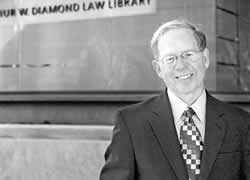Michael Rebell to Lead Campaign for Educational Equity at Teachers College
Initiative Will Focus on Closing Education Gap
Nation's Foremost School Finance Litigator Joins Forces with Leading School of Education;
Michael A. Rebell - lead counsel and strategist in the nation's most prominent school finance lawsuit - has been named to lead the newly launched Campaign for Educational Equity at Teachers College, Columbia University. The Campaign seeks to overcome the gap in educational access and achievement between
The College announced both the Campaign and the hiring of Rebell at a press conference held today at its offices at the former Hotel Theresa in
"We're here today to launch a new organization that will tackle the most urgent issue in education," said TC President
Levine described the
"One chiefly serves our more affluent, suburban white children, while the other primarily serves low-income, urban children of color."
Citing statistics that show how poor and minority children significantly trail their wealthier peers not only in academic performance, but also in family wealth, health and health care, and ultimate avoidance of crime, violence and incarceration, Levine said, "That's what we're talking about at Teachers College when we talk about inequity in education. It's why we consider 'the gap' to be the educational equivalent of AIDS or cancer in medicine, and why - with the support of our trustees, faculty and students - we have made closing it the new mission of our college."
The Campaign for Educational Equity will focus on research (including an annual Symposium that will bring together experts from around the country, and a Report Card that will assess progress toward equity both at the national level and in each of the 50 states); rapid and accessible dissemination targeted at the media, government, school boards, school administrators, teachers, funders and other actors needed to implement research findings; and demonstration projects, including programs in schools and communities (particularly in New York City) that have the potential to become national models.
It was that combination of scholarly and pragmatic focus that prompted the hiring of Rebell, said TC trustee
For the past 13 years, Rebell, a
"Winning more money for schools is only the first step," said Rebell, who will continue to assist CFE with its litigation. "I'm taking on this new role because we have won the first half of this battle and now we've got to actually begin the process of improving our schools. And the idea that's got me excited is: Now we can bring to bear all the resources of Teachers College, the country's leading school of education, to make that happen. We can now move this stage of the equity campaign into a world-class institution where dozens of top scholars and policy experts are already wrestling with equity issues."
In addition, Rebell says, as a result of testimony gathered in the CFE case and other state lawsuits, he brings to his new job "the nation's largest database of potential solutions to problems like class size, teacher quality, pre-school and after-school programs, aging school facilities, multi-language issues and much more."
Rebell is an experienced attorney who has specialized for decades in education law litigation, including special education, desegregation, school decentralization and testing. This past spring, he received Teachers College's Medal for Distinguished Achievement in Education. He is also the co-author of two books, Equality and Education and Educational Policy Making and the Courts. Previously an adjunct faculty member at Teachers College and
In creating demonstration projects - programs in schools and communities that have the potential to become national models - the Campaign for Educational Equity will build off a nucleus of existing partnerships between the College and the
"The model here is very much an interactive one," said Darlyne Bailey, Vice President and Dean of Academic Affairs at Teachers College. "We're not going into these areas and saying, 'Here's Teachers College to save the day, we have all the answers.' Instead, we're trying to forge a partnership with community and civic leaders, businesspeople, parents, principals and teachers."
Published Wednesday, Jun. 8, 2005
